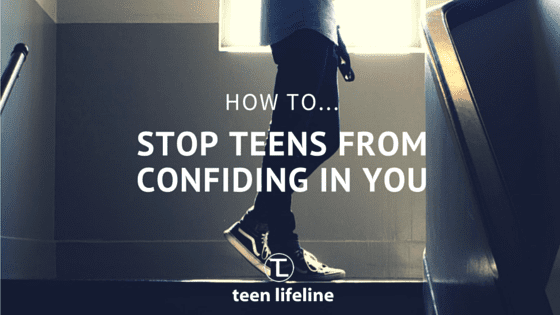One of my favorite parts of my job is getting to encourage teenagers to have meaningful relationships with adults. We talk about who they are close to and who they can go to for help. I love encouraging them to find adults that they can confide in and who will speak truth into their lives.
Unfortunately, when we talk about parents, teachers, and other adults, students often say something along the lines of, “I can never tell them anything because…(fill in the blank).”
Some of this can be attributed to those teenage years when many students want to separate themselves from adults as much as possible. However, there are also many adults who are acting (probably unintentionally) in a way that insures teenagers will never talk to them about anything serious/important.
Here are a few ways that you can make sure teenagers never confide in you:
Tell them that they are just being dramatic.
Teens have a flair for the dramatic – we know this. However, when they are sharing something important and personal, that is not the time to point out those dramatic tendencies.
If they are sharing feelings of depression or thoughts of suicide, always take that seriously. First, make them feel validated in their feelings, and then you can ask more questions to determine what the next step should be. I’m sure you would rather be on the safe side of believing them and getting help, rather than blowing it off and having to get help after something bad has already happened.
Be dramatic when they tell you something.
While you can’t tell them that they are being dramatic, you also cannot be dramatic in return. I have had many teens (especially guys) tell me that they don’t share things with their parents because they freak out, cry, ground them or “make them go to church and confess.” (A real student told me that).
I know it can be upsetting if your child tells you that they are pregnant or failing or on drugs or depressed, but you must remain shock proof in front of them! Later when you are alone, you can break down, but how are they supposed to trust you to help them if you can’t even handle what they are telling you?
Betray their confidence.
Hear me out on this – there is a difference between asking a professional, a minister or a good friend for help and gossiping to your friends about what a teen is going through.
If it is a matter of safety (they are hurting themselves or someone else, or someone is hurting them), then you need to report that conversation or get help. However, I once had a student tell me that after they spoke to a teacher in confidence, he overheard that teacher laughing about it with a few other teachers. I can guarantee you that he never chose to share personal information with that teacher again.
Don’t believe them.
As adults, sometimes it is easier to avoid the issue or pretend like they are lying rather than deal with the hard truth of what is going on.
Earlier this year, a teacher pulled me into a room with a high school girl who was already getting help from the district but needed someone to listen – and because I happened to be around, that person got to be me!
Sitting across from this girl who I knew nothing about, I told her that I just wanted to listen – without judgment or a miraculous answer to fix all of her problems. And then, I starting asking questions.
What is going on? How are things at home? How is your relationship with your mom?
And she started to open up! After only a few minutes, I discovered that her stepfather had sexually abused her. While the school was aware of this and taking the necessary steps to protect her, I got to ask about her heart and the state of her family. Unfortunately, she told me that she had shared this abuse with her mom, but her mom immediately took the stepdad’s side and discredited her story.
Through more questions, I learned that this high school girl was dealing with much more than past abuse – she was battling depression and having somewhat of an identity crisis – but she was very clear that she would never talk to her mom about anything like this again.
Typically when a teenager tells you something personal and important, what they need most is for you to believe them. They need you to listen and offer your encouragement that you will help them through whatever is going on – don’t take that for granted!
It can be hard to gain a teenager’s trust, but if you break it, it is nearly impossible to gain that trust back.
Be someone that a teenager can trust.
Listen.
Don’t judge or speak before you completely hear them out.
You would probably be surprised what I can get a teen to tell me in a 45-minute group. But this shouldn’t be surprising because they should be able to tell you the same things!
I am begging you, stop giving teenagers an excuse to stay closed off. Stop doing the things I’ve mentioned above and be an adult they can count on.
When this happens, come back and share your stories with us! They need more adults like you!
Check out the Stay Calm, Don’t Panic! Podcast episode called “Don’t Panic About Talking to Your Teen”


Educative content
Thank you for being here, Angela! And thank you for the positive feedback!